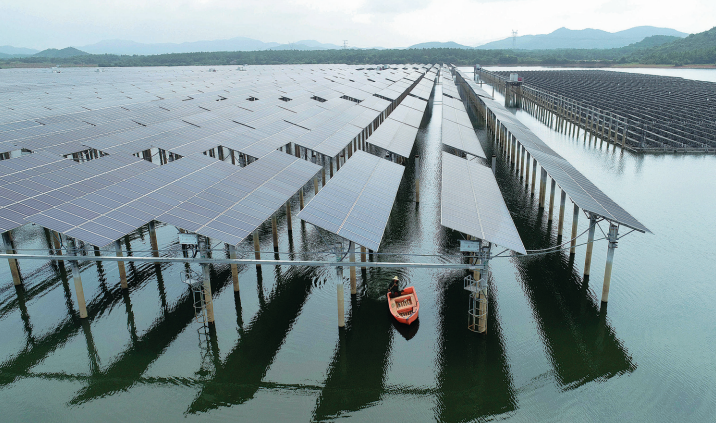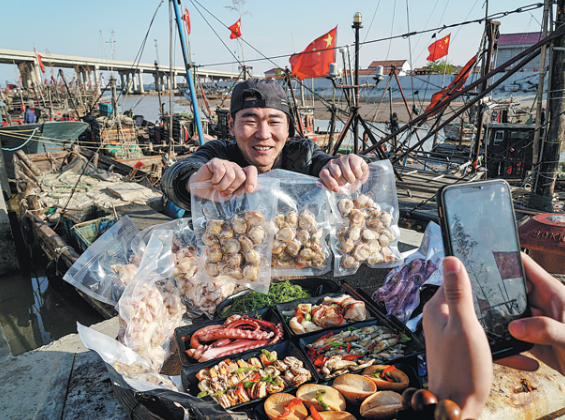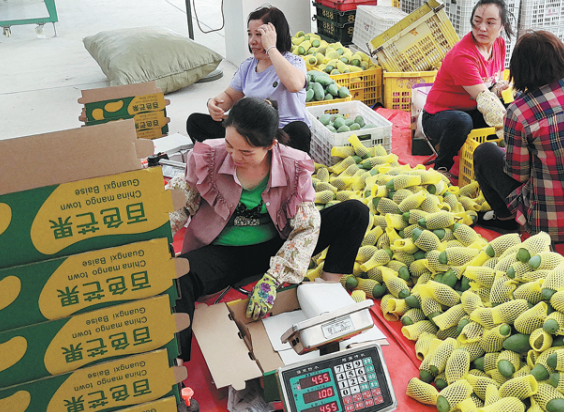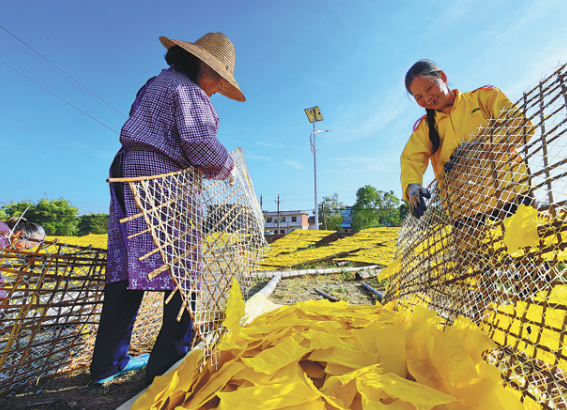Giant strides taken to conquer poverty
This year, the authorities have raced to erase the last traces of absolute poverty on the Chinese mainland.
This year, the authorities have raced to erase the last traces of absolute poverty on the Chinese mainland.
Last month, the central government announced that the country no longer had any impoverished counties. Just five years ago, the number of such counties stood at 832.
The achievement is testimony to the success of a campaign that has been stepped up under President Xi Jinping's leadership.

However, despite the progress made, the nation has yet to announce that 98 million farmers who were below the poverty line in 2012 have all escaped from penury.
The year began with the COVID-19 outbreak, which in January triggered stay-at-home orders, travel restrictions and a sweeping ban on the wildlife trade.
The measures were aimed at halting the spread of the then-little-known novel coronavirus, which was suspected to have jumped to humans from animals such as bats and bamboo rats.
Although the measures proved effective, the epidemic control policies that were introduced had significant side effects.
Tens of millions of migrant workers, farmers and animal breeders in rural areas found themselves on the verge of bankruptcy in the early days of the outbreak due to lost jobs and business opportunities.
The disease also triggered a temporary surge in food prices and threatened to reverse the years long, top-down drive to help poor farmers with vocational training sessions, easily obtainable loans, low-cost healthcare and other tailor-made aid programs.
It also raised concerns that the nation's goal to banish domestic poverty by the end of this month would be scrapped.
On March 6, the central authorities said the country remained on course to end poverty, despite the number of locally transmitted cases of COVID-19 each day remaining in double figures.
Addressing a symposium, President Xi said lifting all rural residents living below the poverty line out of penury by the end of this year was a solemn promise made by the CPC Central Committee, and it must be fulfilled on time.
He added that Party committees and governments at all levels should advance the fight against poverty with greater determination and intensity.
They should overcome the impact of COVID-19 to clinch a complete victory in eradicating poverty in a cause of tremendous importance both for the Chinese nation and humanity, he said.

Benefits expanded
Resolve was quickly transformed into action, with central government departments strengthening safety nets for vulnerable groups in an attempt to offset lost working hours.
In early April, the Ministry of Human Resources and Social Security decided to expand benefits for those out of work, with recipients given a further six months to claim their entitlements.
The ministry also introduced special subsidies to compensate for rising prices.
For example, the authorities in Meizhou, Guangdong province, where food prices rose by more than 26 percent in February, launched the subsidies in May to help low-income families, orphans and the jobless.
Each person was entitled to claim about 750 yuan ($115), according to the local government.
In July, the Ministry of Civil Affairs and the Ministry of Finance decided to allocate financial aid to jobless rural workers and other unemployed groups not covered by insurance plans.
For an extended period of time, these groups were allowed to claim monthly payments equivalent to the local minimum wage.
The move was considered crucial because large numbers of migrant workers — usually from impoverished families — do not take out unemployment insurance.
With insurance costs shared among workers, employers and the authorities, by opting to remain out of insurance plans, workers can avoid further deductions from their wages.
According to the Ministry of Civil Affairs, financial aid awarded as a result of the virus reached 3.7 billion yuan by July, with tens of millions of vulnerable citizens benefiting.
The ministry said that in the first quarter of this year it helped more than 144,000 homeless people, some of them migrants stranded in big cities due to travel restrictions imposed during the outbreak.
The authorities also worked to protect employment by chartering trains and buses to help migrant workers from the countryside reach jobs in urban areas and introduced tax breaks and fee cuts for employers hiring poor people or refraining from firing workers.

Wildlife trade
Farmers in southern areas of the country had long bred bamboo rats and other species to bolster their incomes in the fight against poverty.
However, this industry took a hit in February, when a sweeping ban on trading and consuming wildlife was introduced amid concerns that such animals may have played a role in spreading the novel coronavirus to humans.
After months of deliberations, in late May, agricultural authorities decided to no longer treat the bamboo rat as an edible species.
In August, Shen Yueyue, a vice-chairwoman of the National People's Congress Standing Committee, the nation's top legislative body, said more than 244,000 farmers had been affected by the ban on the wildlife trade.
The value of their animals was estimated at 11.3 billion yuan and that of their breeding facilities at 7.43 billion yuan, she added, prompting the authorities to act quickly to help breeders move to other lines of work.
Guangxi Zhuang autonomous region, which had a bamboo rat breeding industry valued at about 2.8 billion yuan a year, has been a front-runner in rolling out localized guidelines to compensate breeders of 12 nonconventional species.
This action was part of a broader effort to prevent bankruptcies and poverty on a large scale among the animal breeding community.
In June, Guangxi's forestry and financial departments jointly issued a guideline on ways to compensate the breeders, outlining payment standards for those raising different types of wildlife, along with ways to dispose of the animals.
The guideline stated that breeders were entitled to 180 yuan in compensation for each bamboo rat, equivalent to the market price.
It also urged local forestry authorities overseeing wildlife protection to work with poverty relief departments to ensure that poor farmers received compensation, found new jobs and did not slide back into penury.
The Poverty Relief Office in Guangxi said that by the end of July, it had allocated a total of 460,000 yuan in compensation to farmers in eight impoverished counties.
Zhang Wenming, who received compensation for 1,000 bamboo rats slaughtered in summer, quickly found work selling mangoes, silk and other local specialties through livestreaming platforms, with the aim of cashing in on the nationwide e-commerce boom.
"I thought to myself that I could not just sit there and wait to die," he said.
As the number of domestic COVID-19 cases fell in summer, flooding inundated farmland and homes in southern areas of the country, from Chongqing to Jiangxi province.
According to Xinhua News Agency, by June 9, floods had affected some 145,900 hectares of land in 11 provincial areas growing tea, chilies and other crops. Some agricultural facilities were also destroyed.

Repairs speeded
In late June, the State Council Leading Group Office of Poverty Alleviation and Development, the country's top anti-poverty agency, urged local authorities to introduce aid for those left impoverished by the floods and to investigate how vulnerable people had been affected.
Officials were also sent to speed up repairs to damaged homes, roads, water conservation facilities and other projects designed to alleviate poverty.
As the floods receded in September, authorities quickly launched sales promotion campaigns for agricultural products, which are crucial to rural industries fostered by local governments in recent years to boost farmers' incomes.
As early as March, the central authorities called for improved efforts to "alleviate poverty through consumption". The move was aimed at tapping the wallets of urban consumers amid lackluster sales of rural produce triggered by disrupted supply chains.
This strategy took center stage in the aftermath of the flooding and other disasters, with the poor population in rural areas falling as economic activity resumed.
In September, the top anti-poverty agency and other departments launched a month-long sales promotion drive, targeting so-called poverty relief products.
Hong Tianyun, the agency's deputy director, later announced that produce worth 41.5 billion yuan had been sold from the start of September to Oct 17.
The sales volume for the first 10 months of the year was 227.6 billion yuan, official figures showed.

Priorities drawn up
The nation's 13th Five-Year Plan (2016-20) ends this year, with eradicating absolute poverty the top priority.
As the country prepares to introduce the 14th Five-Year Plan (2021-25), policymakers are listing priorities to safeguard the progress made during the poverty reduction campaign. They aim to help those who are not considered poor by official standards, but who remain vulnerable.
This move was confirmed by a key document released by the Communist Party of China Central Committee early last month.
The Party proposed maintaining financial support and other assistance in poorer rural regions as part of a broader effort to revitalize such areas.
It also stressed the need to consolidate and expand the "fruits" of the anti-poverty drive.
Zhang Qi, a professor of regional economics at Beijing Normal University, who researches rural affairs and poverty issues, said the wording of the document is a sign that assistance programs are being expanded.
He said the so-called low-income population — which is not impoverished — is likely to be the new beneficiary.
Wu Haitao, a professor at Zhongnan University of Economics and Law, who focuses on rural poverty, said the proposals target relative poverty — the condition in which people lack the minimum amount of income to maintain the general standard of living in the society in which they reside.
Tackling relative poverty is a difficult task and calls for upgraded relief measures to be introduced, Wu said.
He added that the upcoming campaign to revitalize rural areas would provide more indexes to measure progress than current benchmarks such as school dropout rates, access to clean water, safe homes and affordable healthcare.

